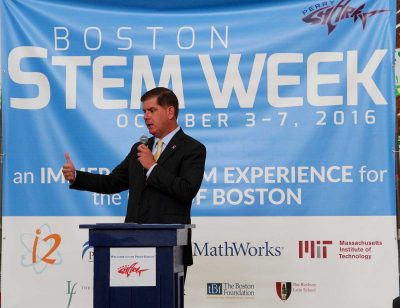
Boston Mayor Martin Walsh stepped up to the podium in the assembly hall at Oliver H. Perry K-8 School in South Boston on Monday morning and asked a group of about 60 fourth and fifth graders, “Who likes football?” Almost every little hand went up.
“Do you think,” Walsh said, “that if the commissioner of the NFL took a STEM class, he would know that those footballs weren’t deflated?” The crowd laughed.
Monday through Friday is the Boston Public Schools’ first STEM Week, an academic week devoted to studying science, technology, engineering and mathematics. Thirty-six Boston public middle schools will spend five whole days studying these fields.
In addition to joking around with the students, Walsh expressed his gratitude for the opportunities this program will provide for the middle school students.
“STEM education is so important in our city as we move forward here,” Walsh said.
Boston Public Schools Superintendent Tommy Chang said that STEM careers are growing at a faster rate than non-STEM jobs, and occupations in science and technology “pay much higher” than other jobs.
“Science, technology, engineering and mathematics workers play such important roles in America right now,” Chang said.
Chang also shared some of his own experiences with race and identity as it pertains to the STEM field. He discussed the importance of having racially and culturally diverse medical professionals and STEM workers in general. The superintendent said during his speech that African-Americans make up only 4 percent of doctors in the United States, and the number of Latino medical professionals is actually dropping.
“My mom and dad came to this country a long time ago, and I remember when I was young, my mom and dad would always ask me to look for a doctor that spoke Chinese Mandarin or Taiwanese … because they wanted a doctor that reflected their identity as well,” Chang said.
Chang encouraged students to pursue STEM careers no matter their skin color and said Boston is a “rich city, a city that is so diverse.”
“Our nation is desperate for young people … to be the doctors, the engineers, the scientists and the innovators of tomorrow,” Chang said.
Geoffrey Rose, the principal of Perry K-8 School, wrote in an email to The Daily Free Press that postponing normal classes to have a week entirely dedicated to STEM was not a difficult decision to make.
“We are continuing to achieve our instructional vision of ‘providing opportunities for all students … to explain their thinking with evidence-based oral and written responses,’” Rose wrote. “Students are consistently thinking, talking, writing, explaining, and experimenting.”
All of the Boston Public Schools’ middle school teachers participated in a two-day summer workshop sponsored by organizations such as MathWorks, the Massachusetts Institute of Technology, The Lynch Foundation, i2 Learning, Vertex Pharmaceuticals Incorporated and The Boston Foundation to prepare for STEM Week.
“It’s working with partners that help us create these innovative and exciting programs that allow us to take new ideas and new technology into education, and to our students, across the disciplines,” BPS Committee Chairperson Michael O’Neill said.
STEM Week was brought to Boston middle schools thanks to sponsorships from a couple of different organizations, but the idea originated with i2 Learning, a foundation that partners with schools and school districts to “bring the program into the regular school year,” according to their website. In four years, i2 Learning programs have been implemented in more than 100 schools, according to their website.
“This is philanthropic,” said Ethan Berman, the founder of i2 Learning. “There are lots of kids who would like STEM if they knew what STEM was about.”
Berman started the program after his daughter developed an interest in building things, but only found opportunities for elementary and high school students. Schools were empty during the summer, so i2 Learning started as a summer camp for middle school-aged students.
This is the first time that i2 Learning’s programs have gone beyond summer camps to have such a citywide impact, reaching about 6,500 students.
“We’ll look at this week and get some feedback,” Berman said. “We’re hoping to roll this out into a national STEM Week eventually.”
Rose wrote that BPS is going to continue to encourage students to pursue STEM careers after STEM Week is over, a goal that will be made easier with their new Google Chromebooks.
“We hope to continue to reach out to the community,” Rose wrote, “to find ways for our students to more consistently engage in ‘real-world’ STEM activities and applications.”























































































































